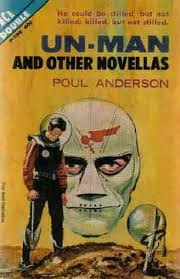For reference, see here.
So far, I have found it helpful to reread "Margin of Profit," focusing on how the text presents Nicholas van Rijn. No new information has emerged about van Rijn himself. However, there is much to be learned about how this major character is introduced. For example, his growling, cavalier treatment of Torres:
"'You speak for the whole unspeakable union, I hope.'" (p. 139)
- does not exactly put Torres in his place. Instead, it puts him to the test in exactly the way that union members would want their representative to be tested. If Torres cannot take this and more, then he should not be in the job.
Their ensuing conversation ought to reveal more about both of them while also informing the reader about the problem that they have met to discuss. First, who do they both represent? Torres, who is both a Captain and a Lodgemaster, represents all locals of the Federated Brotherhood of Spacefarers within the Solar Commonwealth and lodges outside the System have also expressed solidarity. Thus, he does not formally speak for the entire Brotherhood. However, in the circumstances, his words carry weight. We gather from this that the Commonwealth is a political unity coterminous with the Solar System but that trade is interstellar.
Van Rijn owns a single company, Solar Spice & Liquors, and certainly does not speak for all member companies of the Polesotechnic League. He can only agree to inform his associates while acknowledging that some of them might not take any notice. Thus, we learn that there is no formal procedure for the entire Brotherhood to negotiate with the entire League. Torres has to say:
"'We assume you will be a spokesman for the master merchants of the League.'" (p. 140) (My emphases.)
Van Rijn's response to this is as I have outlined. He will not claim to speak for the League but nor will be pass up this opportunity first to address a common problem and secondly to enrich himself in the process. What is that problem? I think that it is time to refer ahead to a future post.

3 comments:
Kaor, Paul!
Exactly! Old Nick was testing the wits and spirit of Captain Torres.
Sean
I suspect 20th-21st Century labor union/employer relations aren't handled like this. I wonder how Nick would work with a German Works Council?:
https://en.wikipedia.org/wiki/Works_council
Germany
Works councils in Germany have a long history, with their origins in the early 1920s in the post World War I Weimar Republic, established by the Betriebsverfassungsgesetz or Works Council Act. Initially, unions were very skeptical of works councils, seeing them as a way for management to negotiate with employees without employing collective bargaining,[7] but eventually they developed clearly defined responsibilities with works councils not allowed to organize strikes or enforce a wage increase.[8] In recent years with a decline in union membership, works councils have come to be seen as a way for unions to recruit members, specifically by having works councils campaign for people to join them.[9]
In Germany, they serve two functions. The first is called co-determination, through which works councils elect members of the board of directors of German companies. The second is called participation, and means that works councils must be consulted about specific issues and have the right to make proposals to management.[10] One of the most impressive achievements of the councils is producing incredibly harmonious relations between management and workers, leading to a situation with strong unions and an incredibly low strike rate.[11] This also allows for a lot of coordination between the firm and the workers, resulting in, for example, the ability of many German firms to dramatically scale back the hours of each worker without large scale layoffs during the 2008 financial crisis, and then slowly scaling back up as the recovery took effect. This was all assisted by the Kurzarbeit, a fund that helps workers who have had their hours reduced.[12]
Works councils in Germany have been correlated with a number of positive effects. They promote higher wages, even more than collective bargaining (although situations with both will promote wages the highest),[13] they make firms more productive (although the degree to which they increase productivity can be hard to measure).[14] and they don’t inhibit investment or innovation.[15][16] Works councils have also been shown to help women, East German, and foreign workers at a higher rate compared to West German men.[13] However, they are correlated lower profitability, likely since they tend to bring higher wages, and there may not be as much benefit in smaller companies as there is in larger ones.[15]
-kh
Keith,
I was a trade union shop steward in Sefton, near Liverpool, in the 1990s. The Conservative government made it the law that trade union membership automatically lapsed unless it was formerly renewed every three years. Not to re-sign was effectively to resign. I worked for the local authority which employed school staff, care staff and workers in other public services. Our response to the new law was a recruitment drive. Stewards visited all Council work premises with union membership application forms. To every employee, not just new recruits, we said, "Are you a member? No? Please join. Yes? Please re-sign." The result was the opposite of the government's intention: an increase in membership. I think that that law was scrapped. At least, I have never heard of it since.
Paul.
Post a Comment